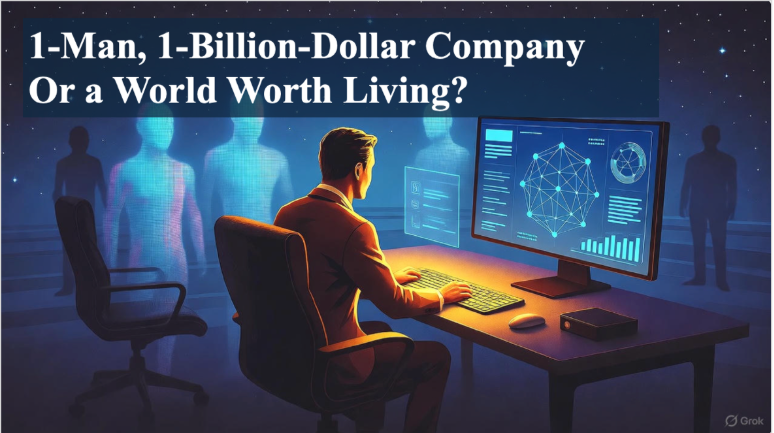October 26, 2025

In a world soon approaching where AI agents outnumber human colleagues, the solo billionaire entrepreneur isn't science fiction—it's the logical endpoint of tech-fueled capitalism. Think about it. The mission of a great company has always been straightforward: solve a massive problem and unlock obscene value for shareholders. From Ford democratizing mobility to Amazon turning shopping into an algorithm, scale meant armies of workers. But what if you could ditch the headcount and still hit unicorn status? Enter the one-person, billion-dollar empire.
So imagine this: You're the CEO, CTO, and janitor rolled into one. No boardroom battles, no HR nightmares—just you, a laptop, and an army of AI agents handling everything from code to customer service. Collaboration? Sure, via APIs with other solo operators or freelance bots. Need marketing? Grok, GPT, and its cousins spit out viral campaigns. Supply chain? Blockchain and drones sort it. The math is mind-blowing: Minimal overhead, maximal margins. We're already seeing glimmers—creators like MrBeast building media empires with slim teams, or developers raking in fortunes via app stores. Scale that with agentic AI, and boom: One human, billions in revenue.
But here's the issue: Is this efficiency or existential dread? We are social animals; take away the water cooler chats, the serendipitous ideas from diverse teams, and what's left? A lonely genius staring at screens, high-fiving virtual assistants. Sure, you'll collaborate across ecosystems—outsourcing to other one-person shops—but it's transactional, not tribal. No shared victories, no collective purpose. And the agents? They're tireless, but soulless. They'll optimize our P&L, but they won't grab a beer after a win or challenge our biases.
Worse, this fetishizes capital creation as the ultimate ambition. Many tech titans are preaching it: Build, disrupt, extract value. It's the gospel fed to Gen Z via podcasts and TikTok hustles. But should we benchmark success solely on shareholder returns? History's great companies—Apple under Jobs, Patagonia under Chouinard—solved problems while fostering human ecosystems. They created jobs, communities, even cultures. A solo billion-dollar outfit? It hoards wealth at the top, exacerbating inequality. The world already has more billionaires than ever, yet median wages stagnate. Do we want a future where the "need of the hour" is more isolated overlords, or one that prioritizes shared prosperity?
I'm not anti-innovation. AI agents could liberate us from drudgery, letting humans focus on creativity and connection. But if the one-man company becomes the norm, we're trading societal glue for solitary gold. The question is not if we can build this future—it's if we should. We should aim higher: Companies that solve problems, yes, but also build worlds worth living in. Because in the end, billions in the bank mean nothing if you're the only one at the party.
Connect to unlock exclusive insights, smart AI tools, and real connections that spark action.
Schedule a chat to unlock the full experience